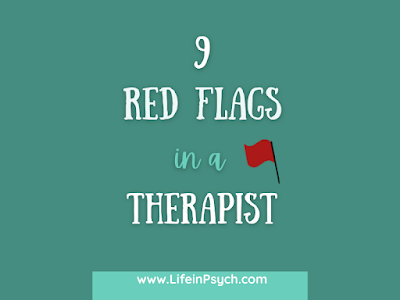I wish I could tell you that all therapists are good therapists; however, this is not always the case. Just like in any profession, there are individuals who are great at what they do and there are people who are... not performing to standards. When you go looking for a therapist, you want to make sure that you are working with someone who is competent. There are definitely some "red flags" that you should be aware of for therapists who are not competent.
Here are a few red flags in a therapist:
1. They tell you that they can fix all of your problems
- If a therapists tells you that all of your problems will go away after working with them- run! Some therapists claim to be the answer to your problems. This can be confusing especially when you see them for a year and you do not have any progress in your life! Some incompetent therapists are looking more for the financial gain rather than your personal gain. They may claim that you need to keep seeing them in order for your life to get better.
- A better therapist will want to help you with your problems, but will never claim to be the solution to your problem. Therapists will give you tools and resources to improve your own life. The goal is self-sufficiency, not dependency on a therapist.
2. Their prices are very low or very high
- Let's face it, therapy is expensive. In Southern California I find that the average price for a psychotherapist is typically $100-$150/per session. This is a lot of money, especially if insurance does not cover it or the therapist does not accept insurance. I hope you find a way that works for you.
- However, be cautious of people who over therapy for cheap (ex. $50 or even free)! This may mean that they are not a licensed therapist and they may not be offering trained psychotherapy. Additionally, people who charge $300/per session and are new to the field of psychotherapy, are likely charging more than what they offer. Honestly, I would never spend that much money on a therapist, but that's just me!
3. They are not licensed
- For California residents, you can check out this website (https://search.dca.ca.gov/) to see if your therapist is licensed. The most common licensed therapist in California are:
- Licensed Clinical Social Worker ( LCSW)
- Licensed Marriage and Family Therapist (LMFT)
- Licensed Professional Clinical Counselor (LPCC)
- A person who claims to be a therapist, yet does not have a license, does not adhere to a governing board. They have no requirements for training and no accountability. In other words, you may be working with a person who is not adequately trained in therapy.
4. They pressure you in continuing therapy
- A good therapist will understand that they are not meant for everyone! Every person has preference in therapists. Some people like a direct approach, while other clients need a more empathetic approach. Some client prefer one modality over another. Therefore, good therapists will refer you to someone else if you share that you would like to end services. They may want to explore the meaning of ending services, but they should not pressure you into staying with them.
5. They talk most of the time
- A red flag for a therapist is if they talk the majority of the session. If the therapist constantly shares their own personal life... it's time to get a new therapist. The focus should be on you! This should be a time where you focus on your goals in therapy.
6. They change or cancel appointments frequently
- It is important to find a therapist who is consistent and organized. A therapist who keeps canceling or changing appointments may be unreliable or not invested in your growth.
7. They force you to talk about stuff you don't want to talk about
- A good therapist will gently encourage you to share about what is going on in your life. A bad therapist will pressure you in talking about topics you don't feel comfortable sharing.
8. They make you feel uncomfortable or unsafe
- If a therapist ever says anything that makes you uncomfortable, this is a good opportunity to a.) talk to them about how they made you feel or b.)find a new therapist. Depending on the comments and/or actions, you may want to immediately leave this situation.
9. They do not go over confidentiality (and the limits)
- Therapists need to talk about confidentiality with their clients. If a therapist does not tell you that everything is kept confidential (except mention of child, elder, or vulnerable adult abuse and/or mention of seriously harming another individual).
















0 Comments